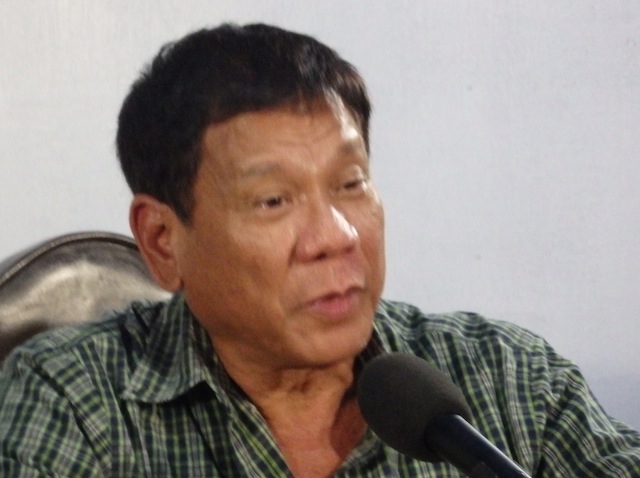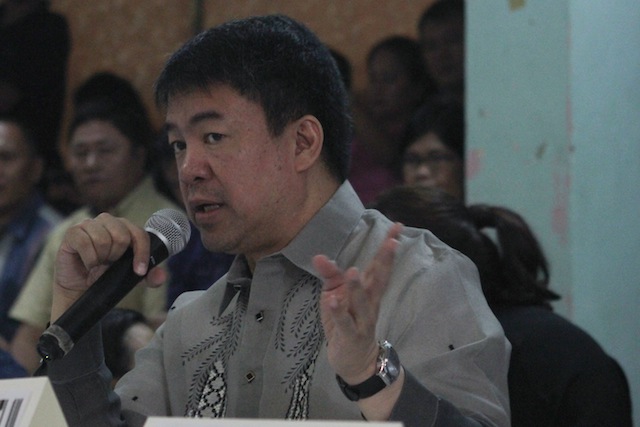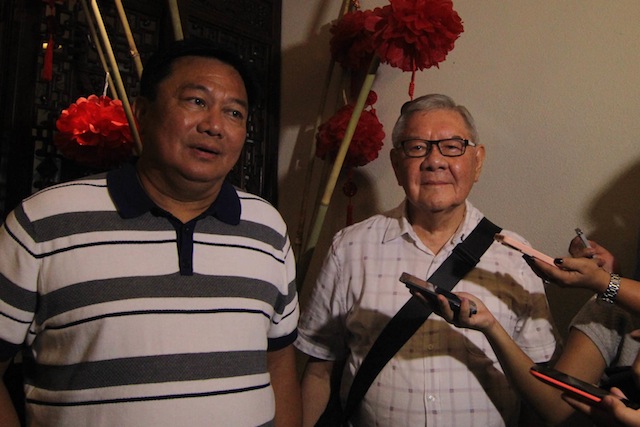DAVAO CITY (MindaNews/09 June) — For the first time in Philippine history, Mindanawons are leading the executive and legislative branches of government with Davao City mayor Rodrigo Duterte as President and two other Mindanawons as Senate President and House Speaker.
 President-elect Rodrigo Duterte discusses various issues in a press conerence in Davao City on Tuesday night, 31 May 2016. MindaNews photo by Carolyn O. Arguillas
President-elect Rodrigo Duterte discusses various issues in a press conerence in Davao City on Tuesday night, 31 May 2016. MindaNews photo by Carolyn O. Arguillas
A lawyer and former prosecutor, Duterte, mayor of Davao City for 22 years, will have a “super majority” supporting his legislative agenda when he takes oath on June 30, with Cagayan de Oro-born Senator Aquilino Pimentel III, President of the Partido ng Demokratikong Pilipino (PDP-Laban) as Senate President, and incoming Davao del Norte Rep. Pantaleon Alvarez, also of PDP-Laban, as House Speaker.
About half of Duterte’s intended Cabinet officials also hail from Mindanao (see other story).
In the 291-member 16th Congress, there are only 67 Mindanawons in the House of Representatives — 59 of them representing congressional districts and the rest, as party-list Representatives. In the count for the 17th Congress, Mindanao will still have 59 district representatives and at the very least, five party-list representatives who are also Mindanawons.
In the 24-member Senate, only two are Mindanawons: Pimentel and Teofisto Guingona III. Guingona lost in the recent election but the next Senate will have three Mindanawons: Pimentel, returning Senator Juan Miguel Zubiri of Bukidon and world boxing icon, Rep. Emmanuel “Manny” Pacquiao of Sarangani.
“No rubber stamp”
Duterte chairs the PDP-Laban, a party that won only one seat in the Senate and at least three in the House of Representatives. But other parties coalesced with the PDP-Laban to form what is now being described as “super majority.”
 INCOMING SENATE PRESIDENT. Senator Aquilino Pimentel III during a Senate probe on the Kidapawan dispersal at the University of Southeastern Philippines on April 7, 2016. Pimentel will be the 23rd Senate President. MindaNews file photo by TOTO LOZANO
INCOMING SENATE PRESIDENT. Senator Aquilino Pimentel III during a Senate probe on the Kidapawan dispersal at the University of Southeastern Philippines on April 7, 2016. Pimentel will be the 23rd Senate President. MindaNews file photo by TOTO LOZANO
Already, fears have been expressed that the next Congress will be a mere “rubber stamp.” But both Pimentel and Alvarez say they will not be a “rubber stamp” but a Congress that would implement Duterte’s vision of a country that would change its political system to federalism and restore the death penalty for heinous crimes, among others.
“Look at the senators who are with me,” Pimentel told MindaNews in a text message Thursday. “They are all independent and strong-willed. I look forward to debates even with the majority. How can such a group be accused to be a rubber stamp?”
“Greatly encouraged”
Amina Rasul, President of the Philippine Center for Islam and Democracy (PCID), told MindaNews she is “greatly encouraged” that Mindanawons are leading the Executive and Legislative branches.
“We must also remember that the Chief Justice of the Supreme Court is part Mindanawon. While I do not see them as going overboard to push a Mindanao agenda, my optimism lies in the fact that finally we have leadership at the national level – all branches at that – who understand our issues. This is not being parochial. The entire country will prosper if Mindanao is developed. The nation will be stable and secure if peace and order will reign in Mindanao. A Filipino nation can finally emerge if all the marginalized regions are given their fair share,” Rasul said.
But Rasul admits she has fears that in Congress, “critical and urgent issues like the peace processes, autonomy and countering violent extremism might be sidelined or bartered in favor of gaining solid majority support for issues such as federalism and economic development.”
 INCOMING HOUSE SPEAKER. Incoming Davao del Norte first district representative Pantaleon “Bebot” Alvarez with outgoing Speaker Feliciano Belmonte Jr during an ambush interview at a hotel in Davao City on June 7, 2016. Alvarez will be the next House speaker. MindaNews file photo by TOTO LOZANO
INCOMING HOUSE SPEAKER. Incoming Davao del Norte first district representative Pantaleon “Bebot” Alvarez with outgoing Speaker Feliciano Belmonte Jr during an ambush interview at a hotel in Davao City on June 7, 2016. Alvarez will be the next House speaker. MindaNews file photo by TOTO LOZANO
Gus Miclat, Executive Director of the Davao City-based Initiatives for International Dialogue (IID) said he has “mixed feelings of optimism and doubt” on Mindanawons holding top posts in the Senate and House.
“What will matter is not where you are from but what you stand for. Doesn’t matter if you’re from Mindanao if your position is anti poor or anti-Moro and and-IP or anti-structural change as that is the bottomline. Otherwise it’s politics as usual with the regional and minority card sadly being bandied to access and hold power.”
Assured of support
Robert Marohombsar Alonto of Lanao del Sur, a member of the peace panel of the Moro Islamic Liberation Front (MILF) and concurrent member of the Bangamoro Transition Commission (BTC) said with Pimentel as Senate President and Alvarez as House Speaker, Duterte is assured of support for his legislative agenda.
“This is strategically important to his legislative agenda foremost of which is changing the Constitution to expedite the shift from the current unitary state to federal state. But then again, take note that outgoing President Aquino had control, too, of the two Houses of the Congress given the fact that Senator Franklin Drilon and Congressman Sonny Belmonte, both stalwarts of the Liberal Party, were Senate President and Speaker of the Lower House respectively. Yet, Aquino failed to pass the Bangsamoro Basic Law in Congress. We hope that this will not happen to President Digong,” Alonto said.
“Having said that though, we believe he is made of a far, far better stuff than Aquino. As such, we are confident he can make the ‘revolutionary’ change he wants to institute. He has our full support,” Alonto added.
“You scratch my back, I’ll scratch yours”
But Datu Michael Mastura, a Political Science professor, former representative of Maguindanao to Congress and senior member of the MILF peace panel, cautioned that the control of the Senate and House of Representatives is a result of “compromises, not real majority party seats.”
“Both Alvarez and Pimentel said they support the shift to federalism. It is rare that the Presidency is from Mindanao. We expect congressional leadership to take this flux. I fear that it is tradpol politics’ ‘business as usual.’ Duterte’s challenge is to use government largesse for pushing Mindanao’s fair share.”
Mastura described the situation as a “quid pro quo,” a “scratch my back and I will scratch yours” relationship.
“It’s not majority/ minority check and balance after all,” Mastura said, adding: “the reality is there are no more party whips in both chambers.”
“Decided like the BBL”
Lawyer Benedicto Bacani, Executive Director of the Cotabato-City based Institute for Autonomy and Governance (IAG) noted that “whether the Coalition for Change in the House and the Senate headed by Mindanawons is founded on a firm belief in the reforms pushed by President-elect Duterte is an open question. My sense is that controversial proposals such as Federalism and restoring the death penalty will be decided like the BBL (Bangsamoro Basic Law) in the Aquino administration: not along party or coalition lines but based on personal, parochial and political interests of lawmakers.”
“Strong clamor and political support for federalism and other reforms from citizens across the country is key to the realization of the reform agenda of President-elect Duterte,” he said.
Benefit of the doubt
Lawyer Ishak Mastura of the Regional Board of Investments in the Autonomous Region in Muslim Mindanao (ARMM) and the Bangsamoro Study Group (BSG) said “if it is Mindanawon in the leadership, the majority of the rest of the country will give them the benefit of the doubt when it comes to Mindanao affairs.”
“So it should follow that in anything to do with a legislative initiative to end the Mindanao Conflict, the majority will defer to the incoming leadership but this will not necessarily take the form of another MILF peace process-centric BBL since other Mindanawon concerns such as Federalism will be the frame or context and there is a need for all Moro groups to help shape that context.”
Deliver the best
Naguib Sinarimbo, another member of the BSG, said there is reason to rejoice over the expected election of Pimentel and Alvarez as Senate President and House Speaker, respectively.
“We see these as opportunities for Mindanawons to show leadership and prove that we are just as good as the leaders from Luzon and the Visayas, if not even better. Beyond capturing these posts, however, we expect them to deliver the best services that our people deserve,” Sinarimbo said.
“As Bangsamoro, we are also concerned with the earlier pronouncements of Rep. Alvarez representative that the BBL is moot as it sends the wrong signal that government is again not honoring its peace agreement with the Bangsamoro. I hope he realizes that the BBL is not an ordinary legislation but the implementation of a peace agreement painstakingly worked out over many years aimed at addressing historical injustice committed against the Bangsamoro.”
Duterte in his campaign sorties repeatedly said he would “correct the historical injustices” committed against the Moro.
“Golden Age of Mindanao”
For former Senate President Aquilino Pimentel, Jr., what his happening now “could be the Golden Age of Mindanao and Mindaonons.”
“Hence, the challenge is greater than what would ordinarily be the case: for the President from Mindanao, the Senate President from Mindanao and the Speaker from Mindanao to show that they are up to their respective jobs and that they are there to promote the common good, not their personal interests or those of the privileged few,” he said.
Pimentel acknowledged the country is faced with a “dako kaayo nga problema” (a very big problem) but is confident that “with God’s help, we will overcome and show the world that Mindanaonons are not second class citizens of the Republic but are as capable as other Filipinos from Luzon or from the Visayas. Or with those from other parts of the world.” (Carolyn O. Arguillas / MindaNews)
